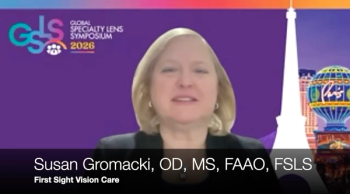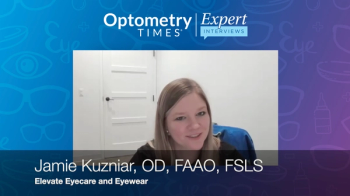
Responding to a request for PD measurements
Most dispensing optometric practices are fielding frequent requests from their patient base to provide pupillary distance (PD) measurements along with a copy of a prescription for eyeglasses. There are varied responses among doctors, the eyecare professionals (ECPs), and other staff members as to how to handle this request.
Most dispensing optometric practices are fielding frequent requests from their patient base to provide pupillary distance (PD) measurements along with a copy of a prescription for eyeglasses.
There are varied responses among doctors, the eyecare professionals (ECPs), and other staff members as to how to handle this request.
While there is no definitive right and wrong approach or response, it can be helpful to study various options and responses before establishing one that best defines your practice.
This topic has been discussed heavily among ECPs, and I have listened and taken notes along the way to study options. I have also taken a survey from our patient base about why patients are asking for the information. The more informed we are, the better we can be prepared to respond when a need arises.
I have heard ECPs state that they will never provide a PD measurement. Some argue that if they do provide a PD, and a patient purchases eyewear online, they have now become part of the manufacturing process and have some liability.
Others charge a fee to provide a PD and go as far to also charge for adjustments to eyewear purchased some place other than their offices.
I have read about doctors having concerns that a PD is actually required by interpretation of law in various states, along with the written copy of the eyeglass prescription.
If you can’t beat them
If you research various websites, you can read many suggestions and trends.
One common theme is that although there is no consensus, we do have to decide how our practices, and our professions, are going to respond to the growing number of requests from patients to be provided a PD measurement.
Many practitioners offer online shopping options to their patients in addition to being able to shop in a brick-and-mortar setting that employs professionals. This is progressive thinking and offers the patient choices. Often patients will buy from both. In some cases, the online purchase may be an inexpensive spare pair of glasses.
If we are going to continue to be proactive, then we must provide in-house offers for basic purchases as a low-cost option from our offices.
We should something in place to offer that may not compete with the lowest prices offered online-but can be backed up with a warranty and an expert. The way we respond to a patient makes an impact. Keep a positive, friendly, helpful attitude, and never respond in a confrontational manner.
Some ECPs argue that in providing the pupillary measurement, we are actually going to put ourselves out of business. Opticians wonder if their profession is becoming obsolete.
Because online shopping seems to be a growing trend, and we are more frequently asked to provide this measurement, it does stand to reason that more and more sales are going in that direction. We must stop and ask ourselves these questions:
• “If I do not provide patients their PD measurement as requested, will I hurt our practice or help our practice in the long run?”
• “What am I doing to maintain a great relationship with our patients?”
• “How can I continue to give great customer service, maintain growth in optical dispensing sales, and compete with the online markets?”
Next: Differentiate your practice
Differentiate your practice
Several years back, I saw an opportunity to offer new technology with the introduction of digital lenses. This new technology required specialized equipment to take custom measurements and further education on how to utilize the equipment understand precisely each component, and accurately gather and record them.
We offered single vision as well as multifocal digital lenses to our patients who were quite impressed with the equipment, the technology, and their vision in the digitally processed lenses.
They share repeatedly with others about our equipment, our technology, and how happy they are with their glasses and with the knowledge and friendliness of our entire staff.
We make a point of educating our patients about the requirements for both horizontal and vertical placement of an optical center that correlates to where their eye centers in a particular frame.
Given the opportunity to educate a patient regarding the many requirements and components necessary to fabricate eyewear that not only fits properly but functions as expected often opens the door to retaining a patient's purchase in house. Keeping an open-minded approach to find solutions to this challenge will serve us best in the long term.
Accuracy and quality
One approach I read about in researching how others respond suggests creating a form that a patient signed stating that eyewear purchased from the practice’s dispensary would be warranted. The form also listed the benefits such as free repairs and adjustments and stated that if eyewear was purchased elsewhere, the scenario was much different.
Some offices will be happy to provide a PD measurement for a fee and encourage their patients to return for prescription verification and adjustments.
We have all had moments of spending quality time with a frame selection and eyewear fitting to find out that the patient planned to purchase online or elsewhere-I know it is frustrating. We are fully trained and qualified, but we feel used and face disappointment when the patient is more concerned about price than quality or expertise.
Years ago when I worked at The Eye Foundation Hospital in Birmingham, AL, I had the opportunity to be a part of the new residents orientation. We were allowed to talk about the prescriptions-although the patient could not see her prescription-and offer helpful insight for what would benefit their patients, like where she chose to fill the prescription was important.
In our state, which does not to require a license for the optician, there is a chance that the prescription may not be filled accurately. Today, we all know that a patient taking her prescription and ordering from an online website may get similar results.
How it works in our office
Our office, like a lot of others, earns a dispensing fee only for fitting safety eyewear or a Medicaid order. These glasses get shipped to our office for us to verify their accuracy and quality. We do not charge for adjustments, nose pads, screws, etc., and our industry is known for providing a large amount of service free of charge.
Although we get requests for a PD and we will provide a patient a PD measurement from a pupilometer, patients also get an education in the process. We do not charge for a PD measurement if we provided the patient’s eye examination.
We fully disclose that a PD is only 1 component of measuring a patient, and that the monocular PD placement can vary based upon how a particular frame fits. Being up front and honest seems to be the best policy for our practice. We have had patients on occasion purchase elsewhere, yet the majority come back to us. They find there is a difference in quality and expertise.
To provide or not to provide
Providing or not providing a PD will not stop the growing online eyewear sales, but educating the public and raising awareness of how accuracy matters will go a long way in preserving our profession. I saw a response to another article on PD requests that a question was posed to a patient, "If my price was the same as the online one where would you shop?” The patient's reply was, "Why, here of course.”
Although we cannot always price match, if we can take care of every patient, one patient at a time, listen to his needs, and offer him an education and options that match his needs, we have a better chance of retaining him for a long time. You decide whether to provide a PD, whether to charge, how to respond in a way that best represents your practice dispensary.
When a patient asks for a PD, know your staff is trained with a protocol in place. Know how to respond, and do so in a nice way.
ODT
Newsletter
Want more insights like this? Subscribe to Optometry Times and get clinical pearls and practice tips delivered straight to your inbox.













































